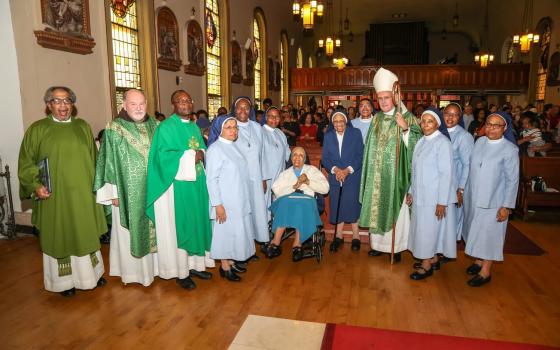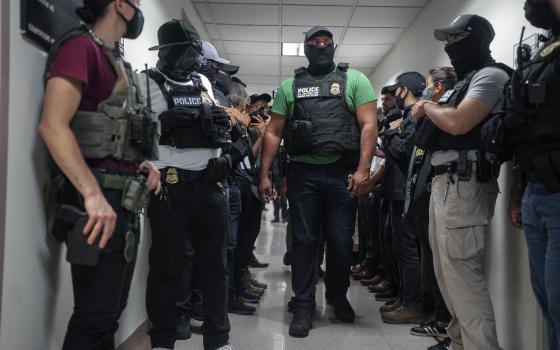Pope Francis has approved the beatification of 10 Polish nuns, all members of the Congregation of Sisters of St. Elizabeth, who were killed by Soviet troops in the waning days of World War II. Pictured clockwise are Sisters Maria Paschalis Jahn, Melusja, Edelburgis Kubitzki, Adel Schramm, Adelheidis Töpfer, Acutina Goldberg, Felicitas Ellmerer, Rosaria Schilling, Sabina Thienel and Sapientia Heymann. (CNS/Courtesy of the Sisters of St. Elizabeth)
Ten Polish nuns have been approved for beatification as martyrs 76 years after they were killed while resisting rape and facing other atrocities by Soviet soldiers in the final months of World War II.
"This will show how courage and devotion are linked to saintliness. It's been an explosion of spiritual joy for us," said Sr. Jozefa Krupa, spokeswoman for the Congregation of Sisters of St. Elizabeth, the religious order to which the women belonged.
"Even with the passage of time, their stories still provide an opportunity to look to the depths of our inner life, seeing what truly has value and is worth defending," Krupa told Catholic News Service.
Pope Francis approved the beatification of the women religious June 19, a decade after officials in the Diocese of Wroclaw launched the process for sainthood.
The women, ranging in age from 29 to 70, were chosen from among more than 100 murdered St. Elizabeth sisters based on the availability of documentation and witnesses, Krupa said.
Meanwhile, a leading Catholic historian said the mass beatification would highlight a little-known historical period and recall the "terrible sufferings" faced by religious orders during the Soviet army's presence in Poland.
"Contemporary opinion still has trouble grasping the parallel criminality of Nazis and communists and isn't much interested in martyr stories," said Jan Zaryn, director of Poland's Roman Dmowski and Ignacy Jan Paderewski Institute for the Legacy of National Thought.
"Poles experienced both totalitarian systems and remember how the Soviets brought terror, rape, arson and captivity with them, arresting and murdering priests and nuns in a bid to prove only lunatics believed in God," he said.
The religious order, founded in mid-19th century Silesia by Blessed Maria Luiza Merkert to nurse cholera and typhus patients, was one of many facing brutality during the 1944-1945 Soviet sweep through Poland.
Reprisals were harshest against clergy of German origin, who were among millions of civilians expelled from a region stretching 140 miles to the Oder and Neisse rivers that was incorporated into Poland in return for Polish lands taken by the Soviet Union in the east.
Among those to be beatified is Sister Maria Paschalis Jahn. She joined the congregation in 1938, caring for elderly and sick nuns. She sought safety with another nun in a parish schoolhouse at Sobotin in nearby Czech Moravia but was spotted by a Soviet soldier on May 11, 1945, and shot when she rebuffed his advances.
Sister Maria Edelburgis, a 40-year-old ambulance nurse, hid with other nuns in a presbytery chapel at Zary, but was beaten and shot during a struggle when Soviet troops entered the building in February 1945.
Sister Maria Acutina, born Helena Goldberg in 1882, taught war orphans and escaped from the village of Lubiaz with a group of girls, only to be apprehended by drunken soldiers and shot trying to protect her charges.
Zaryn said many Polish cities and towns had been "treated as conquered territory to be plundered and destroyed," with Catholic churches torched and priests and nuns "raped, murdered and driven out." The sisters' beatification had been made possible by improved knowledge of what occurred, he said.
Advertisement
Harsh anti-church measures continued in Poland as a Soviet-backed communist regime took power after World War II, viewing religious orders as secretive organizations threatening its absolute power.
In the western region, 323 convents were closed in August 1954 under a campaign codenamed "Operation X2," with more than 1,300 nuns rounded up by armed militia and bused to labor camps with no electricity and where tuberculosis was rife.
A congregation statement said the 10 nuns had been recognized as martyrs from the time of their deaths, as recorded in a 1946 letter by their superior general, Mother Mathildis Kuttner.
"Many girls, women and nuns were raped despite heroically resisting until reduced to a defenseless state by beating. A gunshot often silenced such victims forever," the congregation said.
"For many years, we were not permitted even to mention their Christian heroism. But today their names belong to history, revealing these unbroken witnesses of faith to contemporary humanity."
Another martyred nun, Sister Maria Melusja, was shot trying to protect a local girl from a Soviet trooper at Nysa. And 70-year-old Sister Maria Sapientia was gunned down while defending a younger nun from assault.
Sister Maria Adela, a convent superior in Godzieszów, was seized by soldiers while seeking refuge at a nearby farm and buried in a bomb crater after being shot with her hosts and others.
Wroclaw-born Sister Maria Rosaria, who was once Protestant, hid with other nuns in an air raid shelter but was dragged out and raped by a group of 30 soldiers and shot a day later.
Krupa said she hoped the martyr stories would enhance knowledge of the heroism shown by Polish nuns while encouraging women fearful of discerning a religious vocation.
"These martyr-sisters represent many whose beatification processes haven't even begun. It's an act of recognition for all religious orders," she said.
"Although we've had a long wait, this may also be a prophetic moment, when models of loyalty and sanctity in service to the poor, sick and homeless are very much needed."







